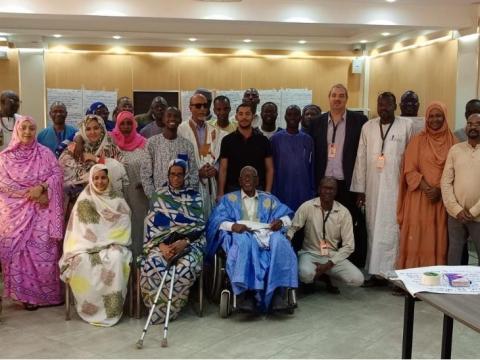Working together for disability inclusion in Mauritania

The inclusion of children and adults with disabilities in World Vision programmes is at the heart of Our Promise to reach the most vulnerable children, and is a key part of our global approach to Gender Equality, Disability & Social Inclusion (GEDSI). Disability is one of the factors used to identify severe discrimination in World Vision's most vulnerable children mapping.
As part of its strategy of including people with disabilities in its programming, World Vision Mauritania in collaboration with its partners has identified huge gaps in terms of capacities/skills of actors but also in terms of availability of statistical data reliable information on disability in Mauritania.
It is in this sense that World Vision Mauritania organized two training workshops called “Traveling together for the inclusion of people with disabilities” from March 18 to 20 in Nouakchott and from March 21 to 22 in Kaédi/Mbagne.
The objective of this training is to strengthen the capacity of World Vision staff in Mauritania as well as state partners and civil society on understanding the root causes of the exclusion of people with disabilities and approaches/strategies for inclusive programming. The training involved participants from various backgrounds and organisations including World Vision, the Mauritanian State, the Federation of Organizations of People with Disabilities, Associations of People with Disabilities, and more.
The specific objectives targeted for participants were to:
- Demonstrate an understanding of the social model and rights-based approaches of the Convention on the Rights of Persons with Disabilities (CRPD) to inclusion;
- Express appropriate personal attitudes towards disability inclusion – these are the foundations for implementing disability-inclusive approaches at World Vision;
- Feel confident in delivering this training to other colleagues and key stakeholders who did not participate in the workshop.
Disability is a complex and diverse reality, affecting millions of people around the world. It can take many forms, whether physical, sensory, mental or neurological. In addition, disability can have a significant impact on daily life, social interactions and access to opportunities. Disability is not only an individual issue, but also a social issue.
People with disabilities face obstacles to full and equal participation in society due to physical, social and attitudinal barriers. These barriers may include lack of accessibility to infrastructure, discrimination at work, stereotypes and prejudices, and lack of appropriate support services.
Alex Whitney, the National Director for World Vision in Mauritania, participated at the training and praised the commitment of all the participants and partners in this journey.
“We are at the end of the beginning of the process”, he noted adding that there are still several steps to take for the effective inclusion of disability in World Vision's programmes in Mauritania. “We have developed together objectives, indicators, etc., which are currently only on paper, but you should know that the work begins now! That is, how to integrate this into World Vision programmes and activities. There are elements that can be integrated and implemented now but others will be in the new 2026-2030 strategy."
Building on from this training, World Vision will intensify collaboration and seek to strengthen its partnership with organisations working with and supporting people with disabilities. We are determined to play a strong part in disability inclusion actions in Mauritania in order to contribute to the well-being of people with disabilities.